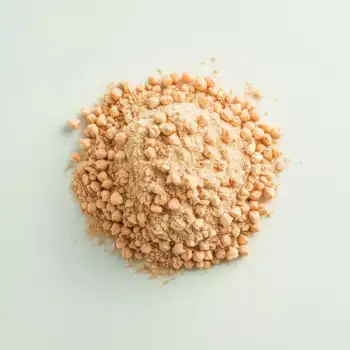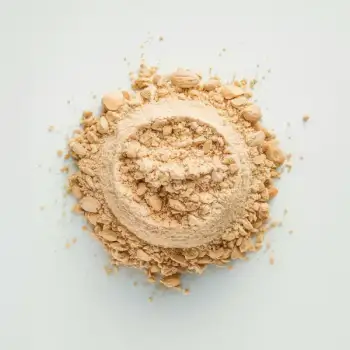Chickpea Flour and Almond Flour are gluten-free flours used in cooking; Chickpea Flour is great for savory dishes and vegan baking, while Almond Flour is ideal for grain-free pastries and rich desserts. They differ in taste, texture, and nutritional content, making them non-interchangeable.

Chickpea Flour, also known as gram flour or besan, is a high-fiber, protein-rich flour made from ground chickpeas. It's commonly used in Middle Eastern, Indian, and Mediterranean cooking.

Almond Flour is made from finely ground blanched almonds and is a go-to for grain-free and low-carbohydrate baking. It's popular in paleo and keto diets for its rich, buttery flavor and nutritional profile.
Chickpea Flour is dense, with a slightly bean-like flavor, and works well for savory dishes, while Almond Flour has a sweet, nutty taste perfect for desserts. Chickpea Flour binds well in vegan recipes, whereas Almond Flour adds moisture and richness to baked goods. They also differ in their nutritional content; Chickpea Flour has more carbohydrates and fiber, whereas Almond Flour is richer in healthy fats and vitamin E.

Your ultimate Recipe Box, Meal Planner, and Cooking Class all in one
Chickpea Flour is ideal for vegan baking, providing structure to items such as vegan quiches or frittatas. Its binding properties make it a great egg substitute when mixed with water. Almond Flour can be used in vegan cookies and cakes, imparting a moist texture and rich flavor. However, additional binding agents, like flax or chia seeds, may be needed.
Chickpea Flour is excellent for gluten-free breads and pizza crusts, offering a hearty texture and nutritional boost. Almond Flour is preferred for gluten-free pastries and delicate cakes due to its fine texture and ability to create light, fluffy baked goods.
Chickpea Flour serves as a grain-free option for thickening soups and sauces or making chickpea pancakes, known as socca. Almond Flour is a favorable choice for grain-free pie crusts and crumbles, adding a rich, buttery flavor and crumbly texture.
Both Chickpea Flour and Almond Flour are nutritious gluten-free alternatives to wheat flour.
| Nutrient | Almond Flour ( per 100 grams ) | Chickpea Flour ( per 100 grams ) |
|---|---|---|
| Fat | 54g | 7g |
| Fiber | 12g | 11g |
| Protein | 21g | 22g |
| Calories | 581 | 387 |
| Vitamin E | 25mg | |
| Carbohydrates | 20g | 58g |
Yes, Chickpea Flour can be used as a thickener, but it imparts a more robust flavor compared to the neutral taste of Almond Flour.
Almond Flour can be used for frying, but it burns more quickly than Chickpea Flour due to its higher fat content.
While possible, Chickpea Flour will alter the texture and flavor of macarons significantly, and the result won't be typical of traditional macarons made with Almond Flour.
Almond Flour is lower in carbohydrates and higher in fats, making it better suited for keto diets compared to Chickpea Flour.
They are not directly interchangeable due to differing flavors and properties. It's important to consider the desired outcome of the recipe when substituting one for the other.